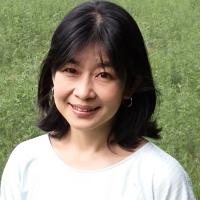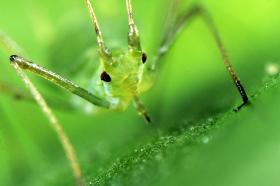
Food, Global Health 5 min
Akiko Sugio, plant protection to ensure food security
Akiko Sugio, a researcher in plant pathology at INRAE, is interested in the interactions between aphids, a major crop pest, and their host plants. She heads a vast research programme in the heart of one of Europe’s largest agricultural regions with enthusiasm.
Published on 26 May 2020
Research director at the Institute for Genetics, Environment and Plant Protection– IGEPP (INRAE, lnstitut Agro, Univ. Rennes 1) at INRAE’s Brittany-Normandy research centre, Akiko Sugio has long been passionate about plant health, and eager to help ensure sustainable global food security. It’s an issue she faces on a daily basis, with extensive international experience under her belt.
As a student in Japan, Akiko quickly became very interested in biotechnology and bioengineering. While others dreamed of flying planes and teaching, Akiko wanted to help make life on other planets possible through the use of biotechnologies... She saw this as a way to find solutions to the increasingly stiff competition for resources.
From industry to research in plant biology
Akiko started out researching enzymes. First, enzymes of extremophile bacteria, at the Tokyo Institute of Technology, then, turning her attention to industry, the enzymes of a large range of microorganisms with potential for use in detergents, food and cosmetics. Along the way, Akiko filed a patent for a fungus-based lipoxygenase, an enzyme of interest for the food industry, since it catalyses the oxidation of polyunsaturated fats.
This brief stint in the world of industry, during which Akiko sunk her teeth into the relationship between plants and fungi, opened her eyes to the fascinating world of interaction mechanisms between organisms. From then on, detergent and cosmetics paled in comparison with the production of essential foods.
Akiko then left Japan for the US to pursue a doctoral degree. At Kansas State University, she studied bacterial blight of rice, a disease caused by Xanthomonas oryzae, analysing its mechanisms of invading host plants.
Winner of a Marie Curie mobility fellowship, Akiko set out for the UK where she finally fulfilled a dream: to work in a renowned institute in the plant sector, the John Innes Centre, and hone her skills in plant-pathogen interactions. She stayed on for six years, studying how plants respond to infections caused by pathogens and how bacteria transmitted by insects manipulate host plants to attract them.
With this solid experience acquired in different professional and human milieus, Akiko then hoped to benefit from professional stability and lead her own team of researchers down the avenues of science that thrill her.
Did someone say aphidology?
In 2012, Akiko joined INRA, which has since become INRAE, where she studied the interactions between plants and aphids. .

“Aphids are small herbivorous insects that latch onto plants and feed on their sap. They are responsible for significant agricultural losses and transmit pathogenic viruses to plants”, Akiko explains.
The Ecology and Genetics of Insects team at IGEPP, which Akiko now belongs to, explores the following topics: how insects adapt to environmental changes; insect interactions with natural enemies and plant hosts; and biological regulation in agro-ecosystems. The team’s goal? Develop sustainable control strategies based on integrated crop protection against pests.
More particularly, Akiko studies how the pea aphid, Acyrthosiphon pisum, manipulates plants the better to feed on them.
“In fact, the term pea aphid includes several different populations, each one specialised in feeding on specific host plants from the legume species (pea, alfalfa, clover, etc.)”, she says.
Akiko’s work focuses on how the saliva protein injected by aphids affects their host plant. She is trying to find out if it is these proteins that determine which plant species each insect will feed on. She is interested in the molecular mechanisms of pea aphid specialisation vis-à-vis their host plants, and also studies the factors involved in pea resistance to aphids. All of these studies are carried out using varied and diverse methods, and through many joint projects with Akiko’s fellow researchers in technical institutes and throughout the world. Their common goal is to find alternatives to pesticides in the fight against pests.
Working towards sustainable agricultural production
In seeking to understand the interactions between plants and pests, Akiko is tackling the major issues of crop production head-on, i.e. why and how plant defences are compromised or inhibited, and how we can protect plants effectively against pests. Her thirst for learning about plant biology is unquenchable.
Thanks to her many travels around the world, Akiko has acquired skills and know-how that she now enthusiastically mobilises to make strides in agroecology and food security. The many ties forged in Asia, America and Europe through her international experience continue to be nourished and strengthened. This openness and curiosity are also put to use in the kitchen, where Akiko likes to spend her free time dabbling in the culinary arts.
• Professional experience
Since 2020 Research Director at INRAE
2012 Research Scientist at INRA
2006-2012 Post-doctoral fellowship, John Innes Centre, Norwich, UK
2001-2005 Research Assistant, Kansas State University, Manhattan, KS, US
1999-2001 Research Chemist, Novo Nordsik (Novozymes), Chiba, Japan
• Education and training
2017 Accreditation to supervise research, University of Rennes 1
2005 PhD in Plant Pathology, Kansas State University
1999 Master of Engineering in Biotechnology, Tokyo Institute of Technology, Yokohama, Japan
1997 Bachelor of Engineering in Bioengineering, Tokyo Institute of Technology
• Distinctions and awards
2004 The Sarachek Predoctoral Honors Fellowship, US
2001-2005 Tillman Scholarship, US
1997-1999 Nippon Ikuei kai grant, Japan
1999 Kamata Izumi Prize, Japan
Boulain H. et al. (2019) Differential expression of candidate salivary effector genes in pea aphid biotypes with distinct host plant specificity. Front. Plant Sci. 10: 301.
Boulain H. et al. (2018) Fast evolution and lineage-specific gene family expansions of salivary effectors driven by aphid-plant interactions. Genome Biol Evol. 10: 1554.
Sugio A. et al. (2015) Plant-insect interactions under bacterial influence: ecological implications and underlying mechanisms. J. Exp. Bot. 66: 467.
